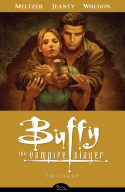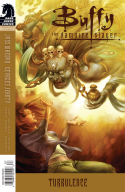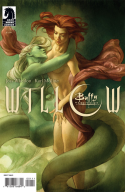By Brad Meltzer, et al. | Published by Dark Horse
 When I write a review, I do my best to articulate what I liked and didn’t like as clearly as possible. When one is a passionate fan of something, however—as I undoubtedly and unabashedly am of Buffy the Vampire Slayer—such clarity becomes more difficult to achieve. I will do my best to explain my aversion to the “Twilight” arc contained in this volume, but what it really boils down to is that I just don’t like it.
When I write a review, I do my best to articulate what I liked and didn’t like as clearly as possible. When one is a passionate fan of something, however—as I undoubtedly and unabashedly am of Buffy the Vampire Slayer—such clarity becomes more difficult to achieve. I will do my best to explain my aversion to the “Twilight” arc contained in this volume, but what it really boils down to is that I just don’t like it.
Spoilers abound. Beware.
The volume actually starts off pretty well, with a Joss-penned one-shot called “Turbulence” (issue #31) that finally gets rid of those irksome colorful goddesses for good and contains an amazing scene between Buffy and Xander wherein she reacts to seeing him kissing Dawn by confessing that she has begun to see him in a romantic light. He is appropriately incredulous:
Xander: Yoooou… have feelings. At me.
Buffy: Would that be good?
Xander: That would be great. If it was a bunch of years ago and you actually meant it.
He also points out that, even if her feelings were genuine, once she saw him and Dawn together she should’ve realized that the decent thing to do would be to keep quiet. Honestly, I’m a little bothered by how immature and selfish Buffy is here, but her desperate loneliness coupled by Xander’s rejection might play a part in her actions a few issues later. Xander, on the other hand, comes off as entirely in character; I think he is probably the best thing about the Season Eight comics, actually.
 Really, the first 2.5 issues of the “Twilight” arc are pretty good, too. Buffy and Xander explore the extent of her newfound superpowers. Dawn is concerned, pointing out that “you don’t get power for free,” and she is proven correct when Willow’s search for the missing Faith, Giles, and Andrew leads to the discovery of a bunch of dead Slayers. It turns out that 206 Slayers have died since the start of the conflict, and Buffy has inherited all of their powers. She’s understandably pretty freaked out by this. “If I’m sucking their power… it makes me a vampire.”
Really, the first 2.5 issues of the “Twilight” arc are pretty good, too. Buffy and Xander explore the extent of her newfound superpowers. Dawn is concerned, pointing out that “you don’t get power for free,” and she is proven correct when Willow’s search for the missing Faith, Giles, and Andrew leads to the discovery of a bunch of dead Slayers. It turns out that 206 Slayers have died since the start of the conflict, and Buffy has inherited all of their powers. She’s understandably pretty freaked out by this. “If I’m sucking their power… it makes me a vampire.”
Meanwhile, the missing trio are being held at Twilight headquarters, where Giles recognizes the enemy’s voice and many hints are dropped concerning what’s going on and Giles’s knowledge of it. “Every Watcher wonders if his Slayer might be the girl… and you’ve had more reason than any.”
The high point of the arc is when Buffy interrupts this conversation to attack Twilight, at which points he unmasks himself. Angel. Buffy’s anger is initially white-hot. “You killed my girls! Two hundred and six girls!” and “Why did you put us through this fucking hell for the past year?!” Angel rationalizes his actions as a way to keep the body count lower than if governments had gotten involved. If he posed as the masked villain and talked of “master plans,” he would distract others who might’ve wanted to take action. Simultaneously, he would focus Buffy and help her superpowers develop.
And here’s where things start to break down for me. What it boils down to is this: by activating all the Potentials, Buffy upset the balance of the Universe. But also, there’s this prophecy (referred to as merely a myth by Giles when he’s accused of not sharing his awareness of the possibility) that a Slayer and Vampire will be used to usher in a new reality of superbeings. Or something. It’s all very vague. When this new reality is established, the old one (and humanity with it) will be discarded. This is what the whole season has been building toward, and it’s just such a disappointment. Ugh.
What I really hate about this idea is that it basically retcons Buffy’s personal attraction to vampires and makes it something that the Universe’s grand plan was engineering. How much of what is happening is free will, and how much is the Universe controlling their actions? Does Angel really believe all this stuff? Or is he essentially possessed? Did Buffy really want to jump his bones so desperately (which she does, in fact, proceed to do) because she’s in a lonely and vulnerable place, or did the Universe make it easy for her to put aside her fury and make with the sexy times?
I also hate how their sexual encounter is treated, with a peanut gallery making jokes about it and many silly panels where they zoom across the sky, bodies entwined, while the world erupts in seaquakes and cyclones. It just looks stupid, but more than that, I think it was done to shock the reader. Is this juxtaposition (NSFW) of imagery and text coincidence? I think not, especially after the whole Buffy/Satsu thing.
 The final issue of the arc offers some redemption, with Buffy gradually regaining her focus after sexual bliss and being dissatisfied with the pleasure paradise to which she and Angel have ascended. He is ready to believe in it (and, again, is this really his personal opinion?) and dwell there together forever but she doesn’t trust it and, more than that, can’t be happy in a nirvana while her friends are fighting for their lives. Her exact words are “Fuck evolution,” and, after a brief sad smile to acknowledge what might have been, she and Angel return to help her family fight off the hordes of demons who have invaded “the lower plane.” Willow is suitably pissed at Angel—“What you got coming you better hope never comes”—and then Spike arrives, seemingly with the intent of knocking a bunch of sense into everyone. Yay, Spike!
The final issue of the arc offers some redemption, with Buffy gradually regaining her focus after sexual bliss and being dissatisfied with the pleasure paradise to which she and Angel have ascended. He is ready to believe in it (and, again, is this really his personal opinion?) and dwell there together forever but she doesn’t trust it and, more than that, can’t be happy in a nirvana while her friends are fighting for their lives. Her exact words are “Fuck evolution,” and, after a brief sad smile to acknowledge what might have been, she and Angel return to help her family fight off the hordes of demons who have invaded “the lower plane.” Willow is suitably pissed at Angel—“What you got coming you better hope never comes”—and then Spike arrives, seemingly with the intent of knocking a bunch of sense into everyone. Yay, Spike!
So, anyway, I just don’t like this arc. I don’t think it was thought through very well, and I don’t like the implications it retroactively conveys upon the events of the series. While I’m airing grievances, I shall also point out that Meltzer gets a basic fact wrong—Faith did not become a Slayer upon Buffy’s death—that no one on the editorial staff was knowledgable (or attentive) enough to spot. Too, Georges Jeanty’s renderings of Faith continue to be extremely ugly. The only way to enjoy her scenes is to just try really hard to imagine Eliza Dushku in her place.
The volume is rounded out by “Willow: Goddesses and Monsters,” another Joss-penned one-shot set before the beginning of Season Eight. In it, Willow takes some sort of magical journey that she originally skipped over in her accelerated path to power. There’s really not a lot going on here, and a lot of the dialogue is supposed to be funny but isn’t, but it’s noteworthy because it’s the first time we’ve glimpsed Tara in the comics.
One more volume to go, and it includes Spike! I never did read the final two issues, so though I am spoiled on one pivotal event, much of it will be new to me. I hope I don’t hate it.




How does this all tie into what’s going on in the Angelverse? Do they even try to get into that?
I don’t know yet. 🙂 Chronologically, the Angel comics occur first. I am assuming that IDW was made aware of what was going to happen in Season Eight, and that the end of their series ties in with what was established in Buffy. Angel makes a passing reference to what he’s been dealing with, but he doesn’t explain how he became convinced to don the Twilighty mantel.
I read an interview with the writer for Angel and Faith, the companion series to Buffy Season Nine, who mentioned that we would see some of Angel’s thought processes in that series, so we shall see. I am going to begin catching up on the Angel comics as soon as I finish the final volume of Season Eight.